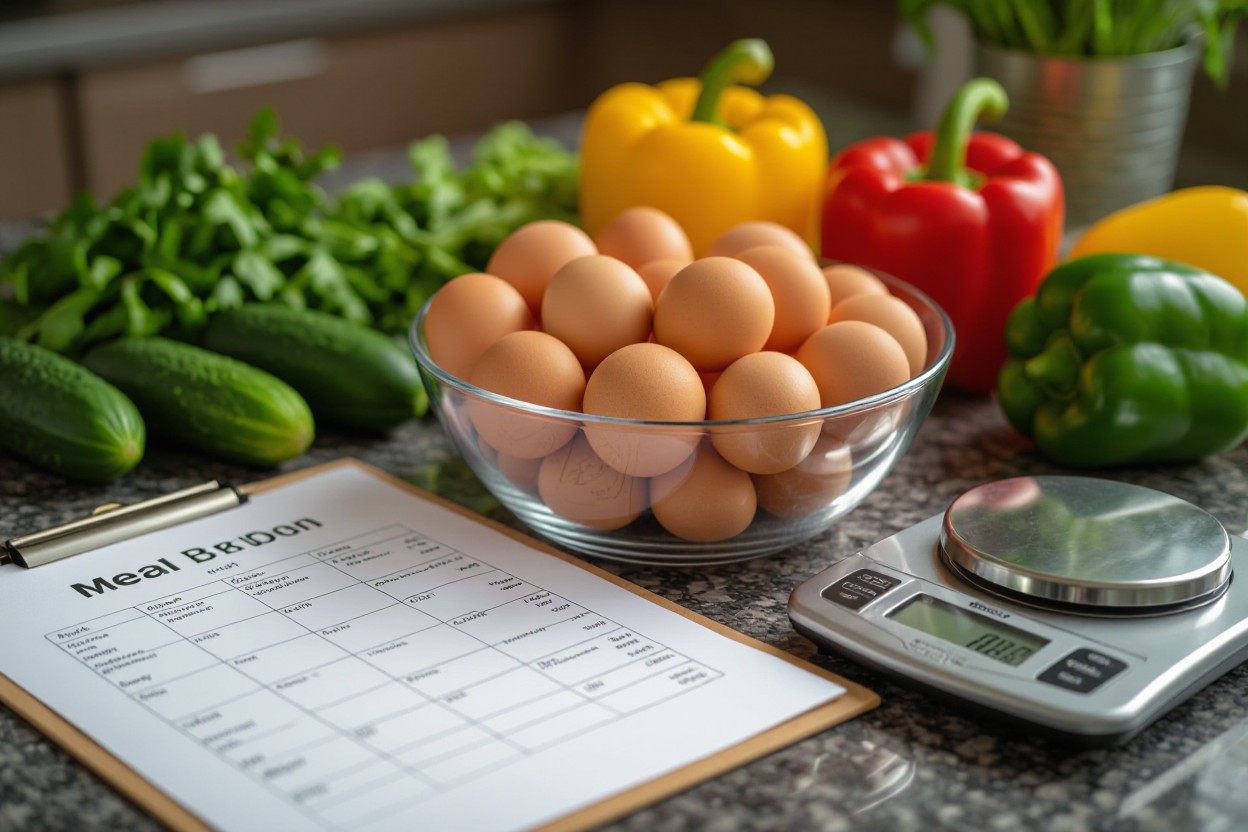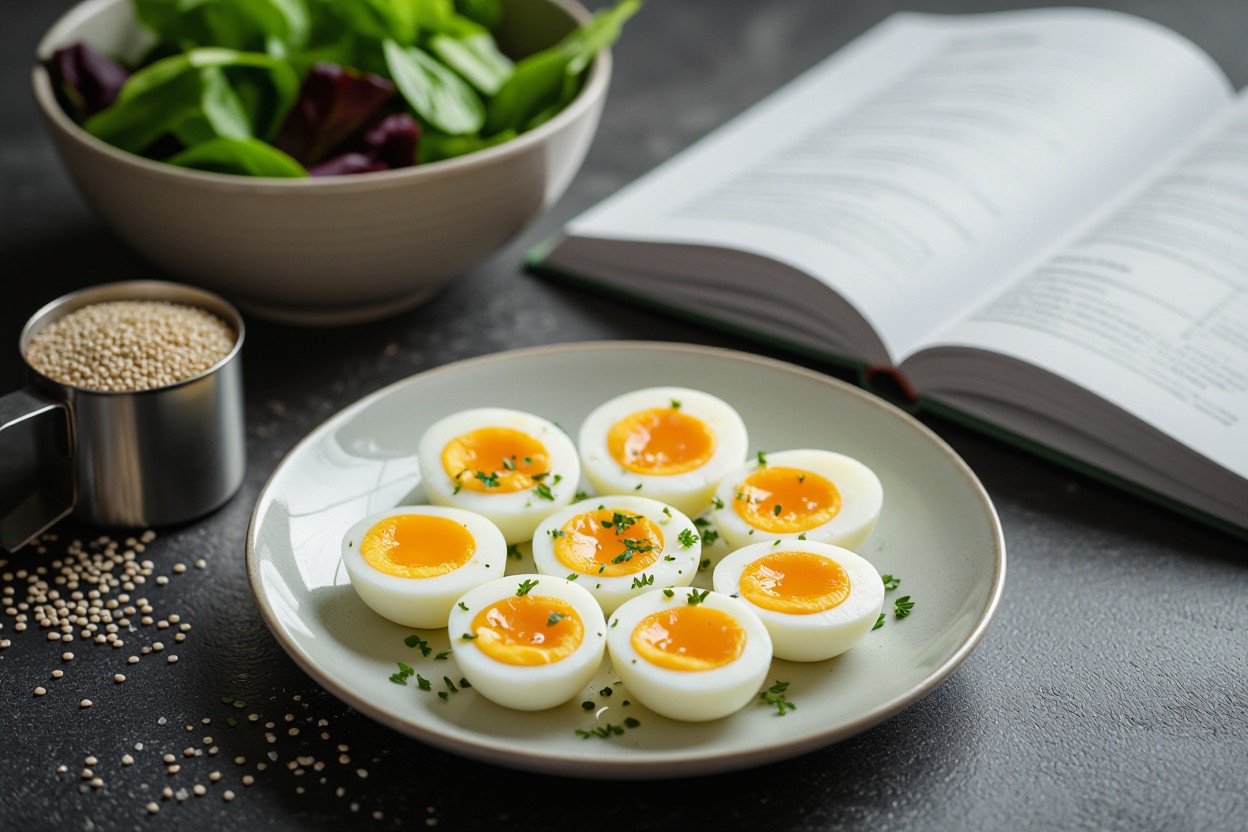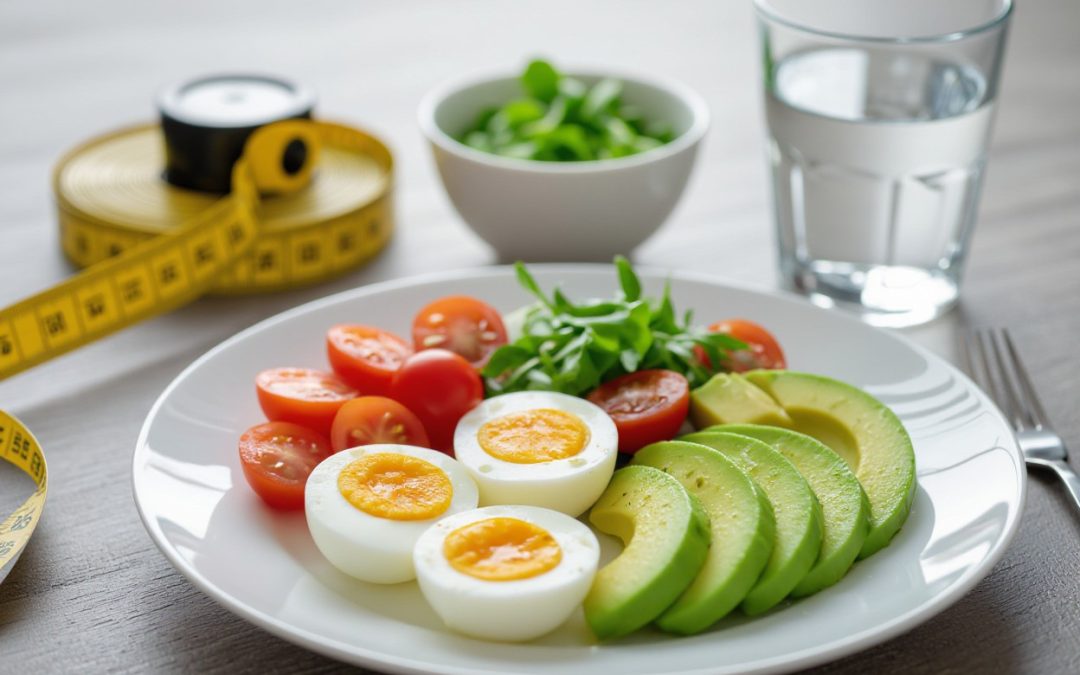With the boiled-egg diet, you focus on eating mostly hard-boiled eggs along with lean proteins and low-carb vegetables to promote weight loss. While this diet may help you shed pounds quickly, it is highly restrictive and low in calories, which can lead to nutrient imbalances and possible side effects. You should weigh these potential risks against any short-term benefits and follow guidance on what to eat to ensure you do it as safely as possible.

Key Takeaways:
- The boiled-egg diet centers on consuming mostly hard-boiled eggs, alongside some fruits, nonstarchy vegetables, lean protein, and fats, aiming for quick weight loss through calorie restriction.
- While the diet includes nutritious foods, it is highly restrictive, low in calories, and not balanced, making it difficult to sustain long-term and potentially leading to frustration or overeating afterward.
- People with a history of eating disorders or chronic health conditions or who are pregnant or breastfeeding should avoid this diet; others may try it short-term but should prioritize more sustainable, whole-food-based approaches for lasting health benefits.

Secrets of the Boiled-Egg Diet: The Basics
The boiled-egg diet centers on simplicity and consistency. You primarily consume hard-boiled eggs alongside lean proteins, low-carb vegetables, and select fruits. This approach reduces calorie intake drastically while keeping protein levels high, which promotes satiety. However, the diet’s rigidity and limited food variety make it challenging to maintain long term. While it can jumpstart weight loss by cutting carbs and calories sharply, you’ll quickly notice how restrictive the plan feels after a few days.
Daily Egg Consumption Requirements
On the boiled-egg diet, you eat at least two hard-boiled eggs each morning, with some plans recommending three or more daily. Eggs can be eaten at other meals too, but breakfast is the cornerstone, ensuring you start with a strong protein boost. This regular intake provides vital nutrients but also means you’re dependent on eggs for a significant portion of your calories, which isn’t sustainable indefinitely.
Nutritional Foundations: What Else Is Involved?
Besides eggs, your meals on this diet include lean proteins like grilled salmon, chicken, or beef, and an array of nonstarchy vegetables such as spinach, asparagus, and broccoli. Limited fruits like oranges, strawberries, and cantaloupe round out the nutrient profile. Fats are minimal, and processed carbs are virtually eliminated, making it a low-calorie, low-carb plan designed to trigger quick weight loss.
Diving deeper, the diet emphasizes low-glycemic fruits and vegetables to manage blood sugar levels while providing fiber and antioxidants. Lean proteins complement eggs to sustain muscle mass during calorie restriction. You’ll find no room for grains, starchy vegetables, or sugary snacks, which can lead to nutrient gaps if followed too long. This narrow focus favors rapid fat loss but demands caution to avoid deficiencies and energy dips.
Weight Loss Mechanisms: How the Diet Aims to Trim the Waistline
The boiled-egg diet promotes weight loss mainly through simple but effective strategies: cutting calories drastically while prioritizing high-protein foods like eggs. This approach limits your carb intake and fills you up with protein and low-calorie vegetables, which can reduce hunger and promote a feeling of fullness. The restrictive nature also minimizes opportunities for snacking or overeating, leading to initial pounds lost primarily from water weight and fat. However, sustainability remains a concern due to the lack of variety and strict rules.
Caloric Deficit: The Role of Restriction
The boiled-egg diet creates a significant caloric deficit by limiting your daily intake to mostly eggs, lean proteins, and low-carb vegetables. This calorie restriction forces your body to burn stored fat for energy. With fewer carbs and less overall food volume, your energy intake drops well below average, which drives weight loss. While effective initially, extreme calorie cutting can slow metabolism if maintained too long and often leads to regaining weight once normal eating resumes.
Metabolic Boost: Protein’s Effect on Fat Loss
Eggs provide a high-quality protein source that can increase your metabolic rate through the thermic effect of food, meaning your body uses more energy to digest protein compared to fats or carbs. This elevated energy expenditure supports fat loss and helps maintain muscle mass during calorie restriction. Eating protein-rich meals, like those centered around eggs, also promotes satiety, reducing overall calorie consumption and making it easier to stick with the low-calorie diet.
Protein requires more energy to metabolize than fats or carbohydrates, often increasing your resting metabolic rate by up to 15-30%. This thermogenesis from protein digestion means you burn more calories simply by eating protein-heavy foods like eggs. Maintaining muscle mass is another benefit, as muscle tissue burns more calories at rest than fat. Some studies suggest diets higher in protein can preserve lean mass during weight loss, reducing metabolic slowdown. For your weight loss efforts on the boiled-egg diet, the protein boost can help counter the typical drop in metabolism caused by calorie restriction, enhancing fat loss efficiency.
Short-Term Gains vs. Long-Term Consequences: A Closer Look
The boiled-egg diet offers rapid weight loss by drastically cutting calories and focusing on protein-rich eggs, which can suppress appetite temporarily. However, this short-term success can quickly be undermined by the lack of sustainability and variety. Relying heavily on eggs while excluding other food groups may lead to nutrient imbalances that can affect your energy and overall well-being if continued beyond a few days. The potential rebound effect, where weight returns once normal eating resumes, often outweighs early benefits.
Potential Benefits: Rapid Weight Loss Insights
The boiled-egg diet can help you lose weight quickly due to its low-calorie, high-protein structure that promotes satiety and reduces overall food intake. Some people shed primarily water weight in the first week, and the protein aids in maintaining lean muscle mass during this rapid drop. For those needing a short-term boost, this approach might provide visible results within days, motivating further health-conscious decisions.
Hidden Risks: Nutritional Deficiencies and Health Concerns
Restricting your diet mainly to eggs and a few low-carb vegetables increases the risk of missing key nutrients like fiber, vitamins C and E, and vital minerals such as magnesium and potassium. Over time, this can cause digestive issues, weakened immune function, and increased inflammation. Low carbohydrate intake also risks lowering energy levels and impacting brain function. Egg yolks, while nutritious, contain saturated fat, and excessive consumption could have cardiovascular implications for some individuals.
Following the boiled-egg diet for an extended period might expose you to micronutrient shortages because it limits fruits, whole grains, and healthy fats vital for balanced nutrition. For instance, a lack of dietary fiber might lead to constipation, while insufficient vitamin C affects collagen production and immune resilience. The absence of diverse antioxidants and phytochemicals from varied plants further reduces the diet’s protective benefits. Additionally, relying on eggs increases saturated fat intake, which could raise LDL cholesterol in sensitive individuals, emphasizing the need for caution and medical advice if you plan to extend beyond a few days.
Crafting Your Plate: What to Include and Exclude
Your meals on the boiled-egg diet should focus on simplicity and low-carb ingredients while steering clear of calorie-dense, processed foods. Combining hard-boiled eggs with lean proteins and plenty of nonstarchy vegetables keeps your plate nutrient-rich without overwhelming your calorie count. Minimizing added sugars and refined carbs helps stabilize blood sugar and cholesterol, both important given the diet’s heavy egg intake. Balancing what you eat prevents nutrient gaps and supports short-term success without intensifying potential side effects linked to restrictive eating.
Foods to Embrace: Lean Proteins and Vegetables
Lean proteins like grilled chicken, fish, and turkey complement eggs perfectly, offering variety without excess saturated fat. Low-carb vegetables such as spinach, broccoli, kale, and asparagus provide fiber, vitamins, and minerals crucial for digestion and overall health. Including these foods adds texture, antioxidants, and bulk to your meals, helping to curb hunger and maintain energy. Fruits limited to lower-sugar options like berries or cantaloupe can also fit in moderately, supporting balanced nutrition alongside your egg servings.
Foods to Avoid: Red Flags in the Boiled-Egg Diet
Steer clear of high-carb, processed foods such as white bread, pastries, sugary cereals, and starchy vegetables like potatoes and corn. These foods spike insulin and triglycerides, potentially counteracting the benefits of the diet’s focus on eggs and lean protein. Fried foods and fatty cuts of meat add unwanted saturated fats, which can elevate cholesterol levels when consumed in excess. Avoiding these pitfalls is key, since the diet’s restrictive nature already limits nutrient variety, and excessive unhealthy fats or sugars can worsen health risks.
Highly processed snacks and sugary beverages can quickly derail your progress on the boiled-egg diet. These items often contain hidden sugars and excess sodium, contributing to inflammation and water retention. Even seemingly “healthy” fruit juices or flavored yogurts may contain enough added sugars to disrupt lipid profiles, undermining heart health, especially when combined with a diet high in dietary cholesterol from eggs. Additionally, artificial sweeteners and heavily salted foods might increase cravings, making adherence more difficult. Mindfully eliminating these red flags promotes clearer results and reduces the chance of nutrient imbalances during this short-term plan.
Sample Structure: One Week on the Boiled-Egg Diet
The week-long plan centers around eating two hard-boiled eggs at breakfast paired with fruit or low-carb vegetables, followed by lean protein and nonstarchy veggies for lunch and dinner. This pattern offers consistency while aiming to keep calories low. Each day varies protein sources—from salmon and chicken to steak and pork—to provide some diversity. Snacks and desserts are generally excluded, emphasizing the diet’s restrictive nature. While simple to follow, this repetitive structure may challenge adherence beyond a few days.
Day-by-Day Menu Breakdown
Each day begins with a breakfast of two hard-boiled eggs accompanied by different fruits or vegetables like spinach, tomatoes, or cantaloupe. Lunches and dinners primarily include lean proteins such as grilled salmon, ahi tuna, or beef roast paired with low-carb vegetables like kale, broccoli, and cauliflower. This varied menu helps balance protein and fiber intake but intentionally omits snacks and desserts, reinforcing the regimen’s calorie restriction and limited food variety.
Snacking Strategies and Alternative Options
Snacking is minimal or nonexistent on this plan, but if you feel the need for something between meals, a hard-boiled egg or a small portion of nuts can provide protein and healthy fats without breaking the diet’s low-calorie framework. Low-carb vegetables like cucumber or celery sticks also work well as crunchy, filling options. Avoid high-carb or sugary snacks to maintain the diet’s intended effects and prevent blood sugar spikes.
Incorporating light, nutrient-dense snacks like a hard-boiled egg paired with raw vegetables helps sustain energy and complements the boiled-egg focus while preventing excessive hunger. Small servings of almonds or walnuts add beneficial fats and aid satiety without exceeding calorie limits. Steering clear of processed or carb-heavy snacks supports better blood sugar control and keeps you aligned with the diet’s restrictive guidelines. These alternatives can smooth the transition through the diet’s low-calorie phases, though frequent snacking may undermine its intended brief duration.
Final Words
With these considerations, you should know that the boiled-egg diet may offer quick results but is highly restrictive and not balanced for long-term health. If you choose to try this diet, focus on variety within the allowed foods and limit your time following it. It’s always wise to consult your healthcare provider before making significant changes, especially if you have underlying health conditions. For sustainable health, aim to adopt a more balanced eating approach that fits your lifestyle and supports overall wellness.


